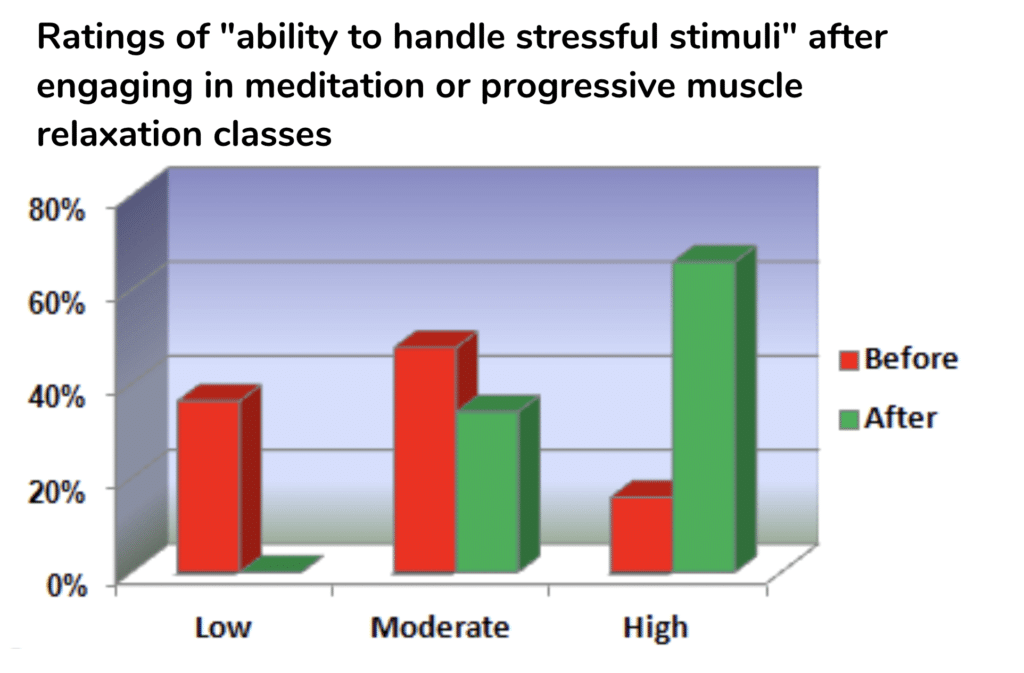
Stress is one of the most common causes of sleep disruptions. Learning how to effectively mentally decompress and separate your day from your night is essential for improving your sleep and overall health.
Here at Rested Health, we want to teach you the habits that have the least effort with the most reward. So, without further ado, here are the most important changes you can make to boost your mind and keep stress from ruining your sleep.
MENTALLY DECOMPRESS BEFORE BED
Action Plan
Mentally decompress before bed
The Problem:
Stress leads to significant sleep problems and sleep problems lead to more stress. Learning how to stop this unhealthy loop is essential for better slumber.
How to do it
Add mental decompression to your evening routine to separate your day from your night.
Choose guided progressive muscle relaxation (PMR) or mindfulness meditation to help you unwind before bed or “easy PMR” below:
Easy PMR
- While laying in bed lie down on your back and stretch out comfortably
- Starting with your face (begin with forehead or jaw) breathe in, and tense the first muscle group (hard but not to the point of pain or cramping) for 4 to 10 seconds.
- Breathe out, and suddenly and completely relax the muscle group (do not relax it gradually).
- Relax for 10 to 20 seconds before you work on the next muscle group. Begin working your way down your body. Notice the difference between how the muscles feel when they are tense and how they feel when they are relaxed.
When you are finished with all of the muscle groups, count backward from 5 to 1 to bring your focus back to the present.
The Science
Stress is extremely detrimental to sleep and can make it. hard to fall asleep, stay asleep and sleep through the night. Stress also lowers the quality of sleep you do get and can even infiltrate your dreams.
Studies show that some people have a stress response called high sleep reactivity. That means, in response to stress they experience more difficulties initiating and maintaining sleep, increased awakenings, deterioration in sleep quality, and decreased REM sleep.
Learning how to mentally and physically decompress before bed is one of the most effective ways to improve your sleep. For instance, Progressive Muscle Relaxation has been shown to boost sleep quality, lower daytime fatigue and even helps with pain management.
Research has shown that mindfulness meditation and PMR helps to lower your daily stress reactivity in response to stressful situations. People who engage in these relaxation techniques not only experience an immediate reduction in stress levels, they also become less reactive to future stressful situation.
Engaging in mental decompression can be done any time during the day but may be especially effective for boosting sleep when done right before bed.


Work it Out
Exercise has been shown to reduce stress levels by 40%! Try going for a walk, lifting weights, or a yoga class. 15 minutes of daily activity is all it takes to start seeing improvements in your stress levels and sleep.
Health Benefits
- Relieves anxiety and stress, leading to better sleep quality.
- Creates an environmental cue for sleep, helping you fall asleep faster
- Reduces high blood pressure, muscle tensions, headaches, and pain.

Tips
- Set aside at least 15-20 minutes before bed to engage in guided PMR or mindfulness meditation. Check out some of our other meditation suggestions!
- Try out different tracks online or using apps to find one that you enjoy!
- Make it a part of your nightly routine to help make it a habit that sticks!






